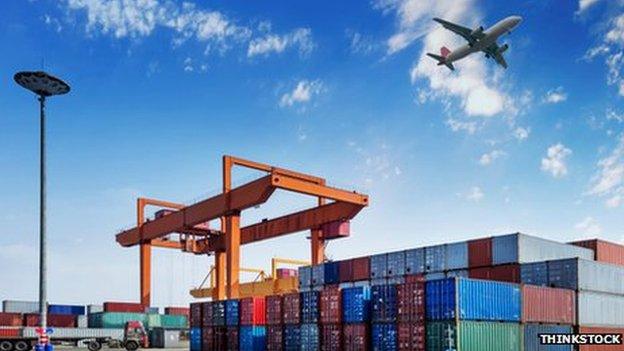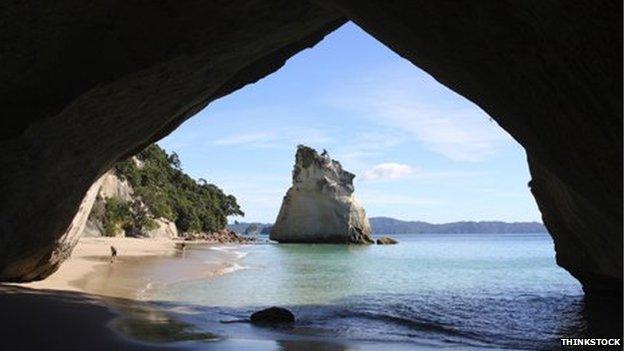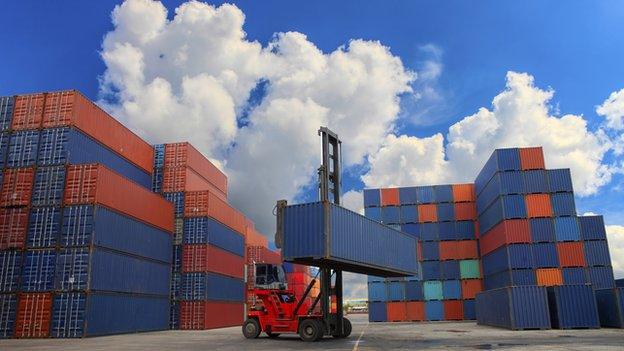Selling Scotland the Rebrand
- Published

The N-56 reports argues for a new Scottish brand
It's a while since we had an economic strategy. And as we've got a new-ish first minister, a new strategy can't be far behind.
Indeed, it's being prepared for publication next month.
The past ones, under Alex Salmond, were focussed on getting Scotland out of the downturn and back on the road to recovery.
Tourism, food and drink featured prominently. And sure enough, whisky and salmon have performed well. Youth unemployment was targeted with a lot of modern apprenticeships.
We were told we'd have "the re-industrialisation of the Scottish economy" based on renewable energy. That hasn't happened.
Yes, there are a lot of turbines on Scottish hills and moors. But hardly any of them are built here.
Of the companies which said - amid much fanfare - that they intended to start building turbines in Scotland, none has put a spade in the ground, while one pulled out, and two merged.
Wave power? No, that's not looking too good either. And there are growing doubts about offshore wind power. More on that expected this week.
Refreshed, not replaced
But at least the economy is on the road to recovery. So with that in mind, the software upgrade of the Scottish government's recovery's route map is, I'm told, "a refresh, not a replacement".

Salmon and Whisky have performed well in the past
It's to bring new emphases reflecting Nicola Sturgeon's priorities. Ensuring that the benefits of recovery are spread throughout society, through "fair work", is likely to be one of them.
Tackling inequality was also the main theme from Scottish Labour leader Jim Murphy, when he set out his thoughts on the economy last week.
Both party leaders argue that inequality is stunting Scotland's growth. They may be right, but it ain't necessarily so. Indeed, the reverse can be true. (I intend to write more about that before long.)
Likewise, science and technology is a priority shared both by the Labour leader and the Scottish government's economic strategy. They're not the first to notice that it has world-leading potential, but a lack of economic traction.
And then there are exports.
Trade trends
The new economic strategy will go big on the importance of exports. And as if by coincidence, an SNP-leaning think tank, which was founded in the heat of last year's referendum campaign, today publishes its own thinking on selling Scotland to foreigners.
Independence is not mentioned in this report from N-56 (a reference to Scotland's latitude). But the familiar tenor of its argument is that Scotland should aspire to be like small independent nations - from Denmark to Switzerland to Singapore - where exports form a much larger part of the economy.
It is noted that the UK runs a very large trade deficit, and cites evidence that its trading activity is heading downwards, while Scotland's (if you trust the limited amount of data) is on the rise.

The N-56 report urges better air links and freight terminals to boost exports
Given that Scottish business sells twice as much to the rest of the UK as it sells to the rest of the world, this report is curiously silent on the potential for growing trade within the union.
It dismisses Britain's trade position as being too much in thrall to the dominant financial services industry. Instead, the emphasis is on building up new markets in growing sectors, and further afield.
Brand new
It argues for improved infrastructure, air connections and freight terminals. It says Scots need to give sales skills a higher profile and status, and in more languages.
There's a suggestion that small companies breaking into new markets could piggy-back off the networks developed by larger Scottish companies that are already established. Or government could do more to pave the way for new trade routes.
It's the branding of Scotland that is the most useful contribution of "Export Based Growth: global competitive advantage from the Scottish brand".
The "Scotland the Brand" initiative, begun in 1999, is dismissed as lacking sufficient follow-up. (It would be interesting to see more evidence on that.)
Jack McConnell's "Best Small Country in the World" slogan is overlooked. (As I recall, that may be the best thing that can happen to it.)
Enduring and dramatic
What leads the way in defining Scotland for overseas markets is tourism. The N56 report suggests that sector is under-rated, and should be an important part of this growth strategy. Although it doesn't look like an export when a visitor (or one of 48,000 foreign students in Scotland) gets off a plane, their spending counts as such.
The characteristics pushed by VisitScotland - people, enduring, dramatic - can be applied to other exports, say the N56 authors, notably food, drink and textiles, and extending to life science and energy.
Analysis of a 20-country branding survey, in which the Scottish government invests, suggests Scotland scores well in tourism, people, and culture, but less so in innovation and creativity.
That much should be obvious. Chinese schoolchildren know about the Loch Ness Monster. Few of them know much about drug discovery in Dundee.
Using the established brand factors to build up more modern and economically useful ones is not a new idea, but N-56 offers some thoughts on other countries that have tackled similar challenges.
Open minds
New Zealand is the place to start. Distant and only sketchily-known to many of its export markets, it launched a "100% Pure" campaign in 1999. Within ten years, helped by a big spend to capitalise on location filming for The Lord of the Rings movies, tourist arrivals were up 50%.

Chinese schoolchildren know about the Loch Ness Monster bur few know much about drug discovery in Dundee
In 2013, it launched "The New Zealand Story" with talk of "open space, open hearts, open minds". This extended the tourism success, with a link to international students, investors, consumers of New Zealand goods and, primarily, business-to-business selling.
Singapore was successful in establishing its fast-growing image on efficiency and stability. Now, it's working to extend that to culture, entertainment and its environmental credentials.
Its place on the Formula 1 circuit helps, but obviously doesn't look all that green, just as Norway has a problem resolving the tension between its environmental credentials and its oil and gas industry.
Functionality
Finland took its brand-building to the people, and concluded that its image should be friendly, skilled, innovative and creative. Indeed, it set out a mission statement worth reflecting upon:
"In 2030, Finland will be the problem-solver of the world. Finland offers the world functionality and sustainable solutions in the form of both products and services as well as a functional society.
"Finland offers the world its ability to negotiate so that the world can be a better place to live. Finland offers the world clean water and food and related expertise. Finland offers the world better education and teachers."
Could Scotland claim to offer the world "functionality"? Would it want to? Maybe it sounds better in Finnish.

New Zealand has successfully boosted tourism by capitalising on its use as a filming location
But seriously, what might a similar project produce if it sought to define Scotland's place in the world?
Ireland is the closest cousin to Scotland's economic outlook. With the need to rebuild from economic calamity and the mauling of the Celtic tiger, N-56 notes that it is deploying the formidable Irish diaspora once more, with the emphasis on quality over quantity.
One interesting difference is in making its global support network into an elite 1000. The Scottish approach, by contrast, has been eager to embrace anyone who will join in.
What, then, can Scotland do better to build up its exports through its brand?
Mixing a strong image of history and tradition with modernity is not a new challenge. But with the Scottish government's new economic strategy, it seems we're about to give it another try.
- Published23 February 2015
